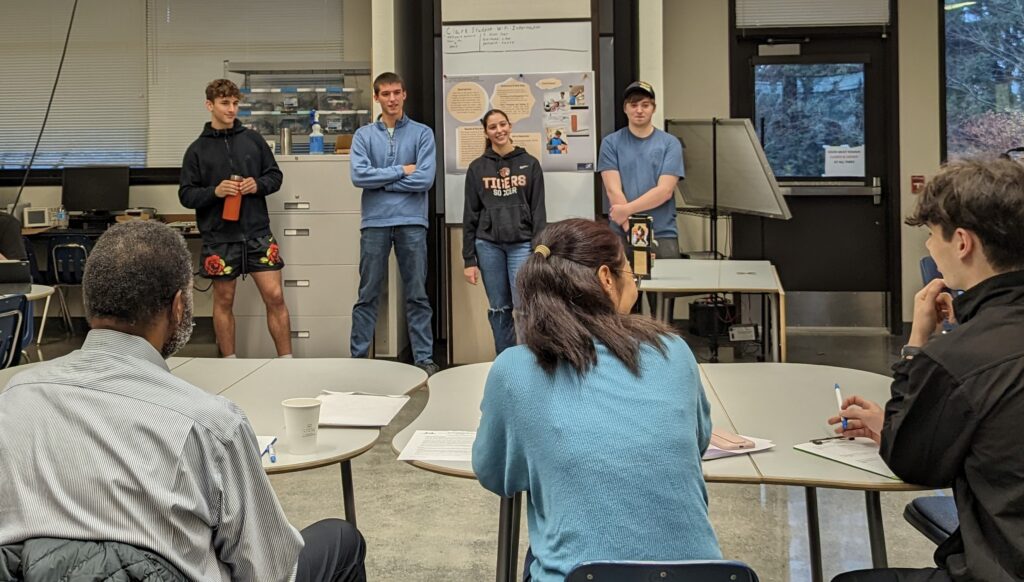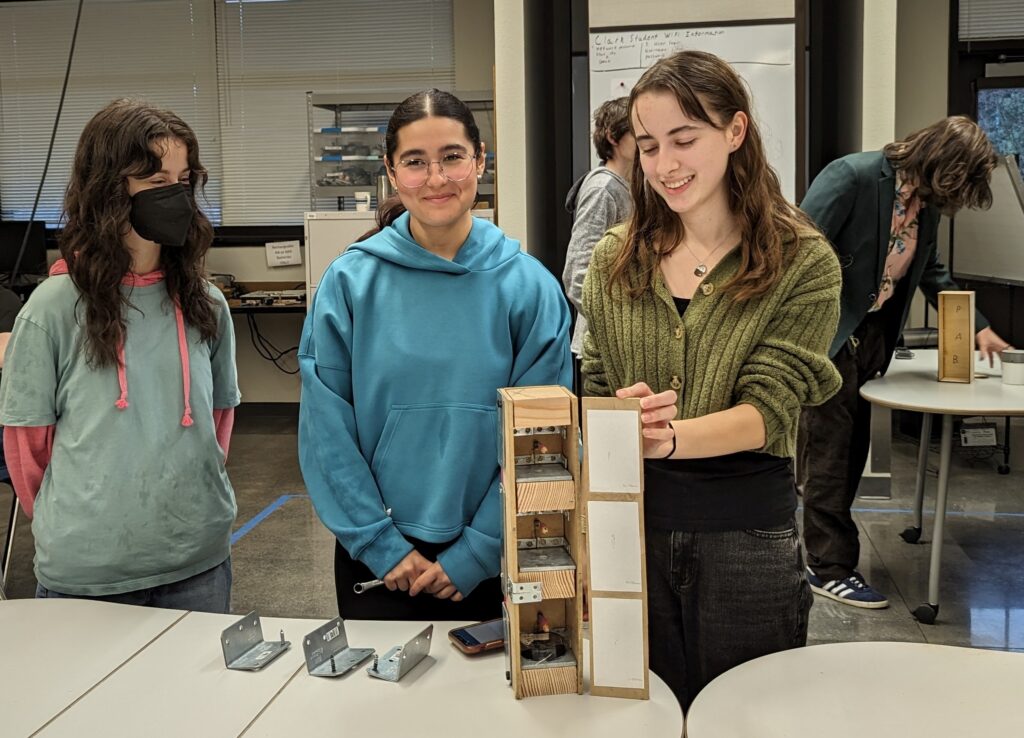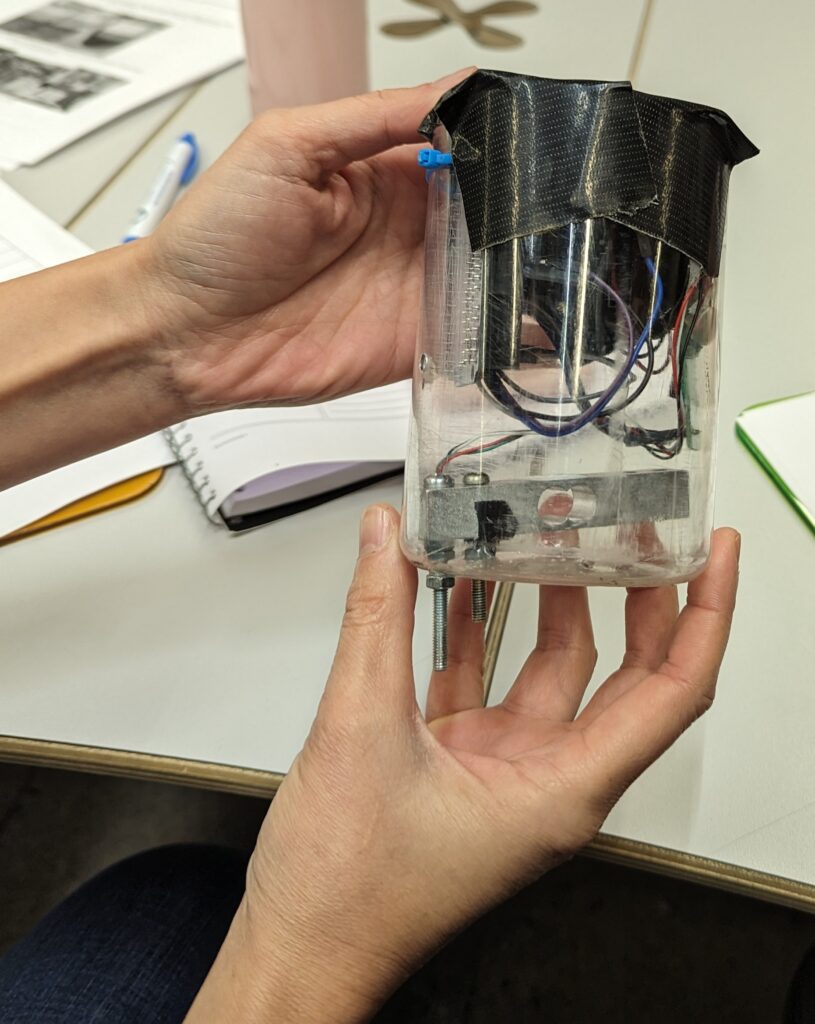Student teams design rocket payload systems prototype

Clark College students Max DuCom, Kohen Mahler, Zachary Zamora, and Elizabeth Zamora stood in front of their Engineering professors, peers, and a team of judges on December 5 in the Collaboratorium in the STEM Building. This was the team’s moment they had worked toward throughout Fall term. They had spent weeks designing and building their prototype. Now it was time to present their project to the group, answer questions posed by the judges, and test their prototypes.
Every term, Engineering professors Tina Barsotti and Carol Hsu pose a real-world problem to their students and instruct them to design and build an object that solves the problem. Teams of four students work together. At the end of each term, teams present their prototype to the group.
This Fall term’s design objective was to design and build a rocket payload prototype that includes scientific experiments and/or technology demonstrations for the Clark College rocket that will compete in the 2024 Spaceport America Cup competition in June in New Mexico.
A payload is cargo that the rocket is carrying. A payload can be a satellite, cameras, scientific instruments, food supplies, fuel or even people.
“The engineering department offers real-world challenges to our students,” said Engineering Professor Carol Hsu. “Then our students work together in teams to solve the problem using the engineering method — by defining the problem, brainstorming ideas, designing prototypes, testing and modifying to improve solutions.”

Trial and error
At the front of the room, Max, Kohen, Zachary, and Elizabeth were ready to begin. One student attached their project posterboard to the presentation wall. Another set their prototype on the table in front of them. Another introduced their project. Each chimed in, telling what specific tasks they worked on.
Their bill of materials included:
- Double-walled water bottle: $12.88
- Wooden top: $2.94
- Arduino UNO: $23.67 (An Arduino is a prototyping micro controller that can be programmed to do multiple tasks, such as turning on lights or motors to sensing temperature or movement.)
- Load cell: $5.99
- Battery pack: $2.99
- Total cost of project: $48.47
One student mentioned that their initial idea was to use a double-walled water bottle as their vessel, but they soon realized it was not the best choice. Instead, they settled on a plastic two-liter soda bottle. They cut the top off the bottle and started again.
A judge paused a question: “May we see the prototype?”
Students walked the prototype to the judges’ table. The judges examined it carefully, passing it from one to the next so all could see it up close.
Then more questions were posed, followed by a discussion about how to improve the prototype. When the judges were satisfied, Max, Kohen, Zachary, and Elizabeth gathered up the pieces of their project and made room for the next team to present their project.
All teams tested their payload prototypes via a drop test. To simulate a 25 feet-per-second impact speed, each team secured their payload in a fiberglass rocket tube and dropped it from a height of 10 feet. Most teams’ payload survived the drop test. A few teams needed minor repairs.
Professor Tina Barsotti added, “Our students are applying engineering principles to address real-life challenges, and this hands-on, practical experience contributes significantly to the strength of Clark’s Engineering program. This mirrors the authentic situations they will likely face in their professional careers.”
About Spaceport America Cup
The Clark Aerospace team launched its rocket, Little Penguin, at Spaceport America Cup competition in Las Cruces, New Mexico in June 2023. Spaceport is the world’s largest IREC (Intercollegiate Rocket Engineering Competition) for student rocketry teams. It is held annually by the Experimental Sounding Rocket Association at Spaceport America.
Rocket teams are evaluated based on the build of their rockets, payload systems, and the flight of the rocket.
Clark College rocket team at Spaceport 2023:
- Nearly 6,000 rocketeers on 158 teams hailing from 24 countries competed in 2023.
- Clark College was the only community college that competed.
- Clark’s rocket team built a rocket that was 12 feet tall and weighed 54 pounds.
- Clark competed in the 10,000-foot apogee with COTS (commercial-of-the-shell) solid rocket propulsion system category
- Clark’s rocket payload system measured temperature, humidity, and radiation in the inner space of the rocket during its ascendant.
- Clark’s rocket soared to about 9,000 feet. It was recovered successfully after the launch.
- Looking ahead: 2024 Spaceport Cup
- Clark’s rocket team plans to launch a rocket with a 4 kg payload (about 8.81 pounds) to 10,000 feet on a non-commercial propellant formulation.
- The rocket team has invited Clark engineering teams to be part of the Spaceport competition by contributing to the design by prototyping a payload system.
Photos: Clark College/Susan Parrish













